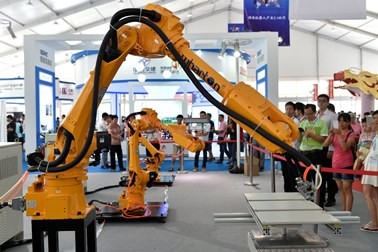Several industry analysts have agreed that more efforts are needed to make the Chinese robotics industry competitive despite its rapid development in recent years, the Global Times reported.
In a recent conference, Zhang Wenqiang, director of the Robot Intelligence Lab of Fudan University, said that 90 percent of the Chinese market is dominated by foreign companies such as Swiss ABB, German Kuka and Japan's FANUC Corp., adding that many Chinese companies have been commissioned to make parts by these firms, which are more technologically advanced.
Zhang said that in terms of product design, material and system integration techniques, many Chinese companies still lag behind their foreign competitors. He also noted that many local manufacturers still rely on foreign suppliers for their core technology and parts.
The report said that robotics research was conducted mainly by universities and research institutes, as several industry observers also pointed out, but little was done to take advantage of the findings for commercial use.
"Many research institutes are now investing heavily in R&D, but they are still somehow distant from the market," Wang Hongbo, a mechanical engineering professor at Yanshan University, said.
"Usually the process of turning technology into products is extremely slow. Currently, more money shall be channeled into application-based technology," Wang added.
According to statistics, the global service robotics industry has generated $17.1 billion in 2010, which is expected to reach $51.7 billion by 2025.
Qu Daokui, director general of the China Robot Industry Alliance, said that with state support for the sector, the Chinese robotics industry has the potential to develop and grow.
"More supportive policies shall be made to facilitate cooperation between researchers and manufacturers to sharpen the competitive edge of 'Made-in-China' robots," Qu said.



























